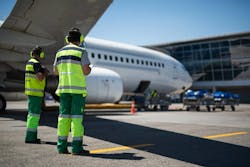The Brazil ground handling sector is realizing increasing growth due to the almost complete recovery of the industry from the consequences of the COVID-19 pandemic and the ongoing reform of the industry, which was initiated by major players within the local government.
This year the aviation sector of Brazil has demonstrated generally good results, which is mainly due to larger attention paid to the industry. Brazil’s President Lula da Siva recently announced his plans to make civil aviation more accessible for most of the local population by significantly reducing the cost of air tickets.
That has already brought some serious results. According to data from the Brazil Civil Aviation National Agency (ANAC) total passenger traffic in Brazil amounted to 44.7 million passengers between January and May 2023. That is equivalent to 93 percent of the pre-pandemic traffic numbers for the country, although it remains the region's second-largest aviation market, behind Mexico.
The growth is also observed in the segment of air cargo. Part of the government’s plan is turning the country into one of the major aviation hubs in the entire region of Latin America in the coming years.
That creates conditions for the growth of the country’s ground handling segment and the rise of the quality of services provided.
In recent years the ground handling sector of Brazil has become a subject of reform and restructuring, designed to bring it to global standards, which is important given the ambitious plans of the Brazil national government.
The pandemic had almost a catastrophic effect on the entire ground handling sector of Brazil, given the drop in revenue and massive personnel cuts. In the latter case, the resumption of most of industry’s activities has unveiled an acute shortage of staff in the industry.
As a result, according to the industry’s key players, hiring of labor by ground service companies had to be anticipated. The sector, which had a contingent of 46,000 professionals before the pandemic, had to lay off a third of its staff.
This has been recently confirmed by Ricardo Miguel, president of Brazil's ground handling association ABESATA.
According to Miguel, there is a forecast for growth in domestic and international air transport in Brazil of approximately 5 percent in 2023. He says that provides an impetus for growth for Brazil’s ground services providers (GSPs).
Miguel also adds that despite the current positive dynamics, there is currently a number of aspects and problems that prevent more active growth of the industry and should be addressed by the state in the shortest time.
“The transfer of services from aerodrome operators and air operators to GSPs has been stagnant since 2021,” Miguel says. “There is an expectation that the arrival of new technologies at Brazilian airport sites in the coming years will leverage the transfer of some ground handling modalities.”
According to Miguel, in general, the current situation in the industry remains quite alarming, which is also due to tightening tax and other pressure, which is put on the industry by the state.
“As for the political scenario, there is no tax or credit incentive for the GSPs; not even during the COVID-19 pandemic was there any government support for the GSPs,” he says. “By the way, a current situation of uncertainty occurs in Brazil due to the announced tax reform and the relationship with the service sector, where the GSP is inserted: The burden of ‘taxes’ should increase from 14 to 28 percent from 2026.”
According to Miguel and other analysts, the planned reform will be the biggest tax changes for Brazil’s aviation and ground handling sectors in the last 50 years.
Despite the existing problems, the development of the market is ongoing towards its improvement, which involves certification of major industry players and the rise of transparency of efficiency of provided services. That has a particular importance as, in accordance with state plans, it will put an end to the problem of monopolization in the industry and contribute to fair competition among major players.
Currently there are nine ground handling companies in Brazil certified according to the pioneering program launched by ABESATA.
According to ABESATA officials and Brazil aviation regulators, the purpose of certification is to bring benefits to the entire aeronautical chain and help airport operators and airlines when hiring reliable ground handling service providers.
“We believe that operators have enough incentives not to be careless with the services they hire so as not to have their operation compromised,” says Giovano Palma, superintendent of airport infrastructure at ANAC, the state agency responsible for the development of civil aviation and the ground handling sector of Brazil.
Currently the list of leading players in the industry includes dnata, Orbital, Swissport, ProAir, RP and In Solo. Many analysts believe an active development of Brazil’s aviation sector in the years to come will contribute to the tightening of competition in the segment and the expansion of new players.
However, much will depend on the further level of state pressure on the industry and the ability of the country’s government to address the most acute problems of the sector, such as bureaucracy.
In the meantime, Brazil’s ground handling sector has been traditionally within the sphere of interests of global players, which consider it as one of the most promising for their growth among other emerging nations – especially given their actual exodus from the markets of Russia and Ukraine.
An example of this is dnata, which in recent years has significantly strengthened its positions and presence in Brazil.
Phil McGrane, CEO, dnata Brazil, notes dnata has significantly expanded its footprint in Brazil in recent years. It currently operates at 29 airports in the country, serving more than 15 airlines with a team of more than 5,000 local aviation professionals.
According to him, the company has continued to grow and to attract top talent, as well as making sure our valued team members feel recognized.
McGrane believes that despite the existing problems the Brazil ground handling sector has big potential for a further growth, providing good opportunities for major players.
“The local aviation market holds tremendous potential due to the size of the country and the abundant tourism opportunities it offers. We expect consistent, solid growth of the market, which will bring significant benefits for the local businesses and people,” McGrane says. “We will continue to work closely with the authorities and our partners and enhance our operations to contribute to the development and expansion of the sector. Aviation plays a critical role in the country's transportation infrastructure, primarily because only 15 percent of the roads are usable and there are no rail or other transportation systems that offer countrywide connectivity.”


